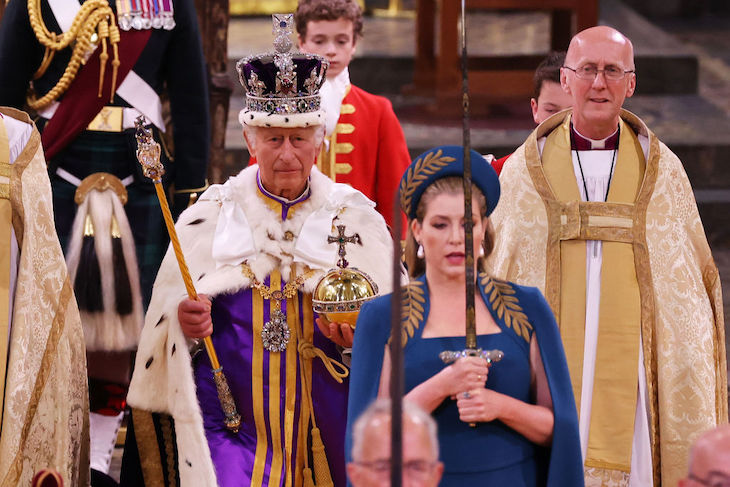A confession: Penny Mordaunt was my teenage political crush. Publicly admitting that would be rather more embarrassing if the performance of the Leader of the House of Commons at the coronation didn’t have my fellow Conservatives infatuated. God knows what my 15-year-old self would have made of her eye-catching role on Saturday, but many Tory supporters were suitably impressed.
As soon as she appeared in ceremonial battledress, ‘Oh my Gods’ at her outfit mixed with tweets of appreciation for her remarkable ability to carry a weighty sword for an hour. Comparisons have been drawn to other formidable women: Boudica, Athena, and Britney Spears. She may not have been crowned this weekend but we have a new Queen of Tory hearts.
Some Conservatives grumpy with Rishi Sunak after the local elections undoubtedly wish Mordaunt hadn’t played her part in his coronation last October by dropping out. The bookmakers certainly think so: Ladbrokes have slashed her odds on her replacing the Prime Minister from 8/1 to 13/2, making her second favourite behind Kemi Badenoch. The pair topped ConservativeHome‘s poll for members’ choices to succeed Boris Johnson last summer.
Nobody doubts that Mordaunt possesses considerable assets. As someone who has keenly followed her career from the backbenches to the Lord Presidency – via two leadership bids, and a few cabinet stints – I know that better than most. She is an excellent communicator: her denunciations of the SNP are highlights of the parliamentary week. Mordaunt helps gee up a Tory party worryingly comfortable with Britain in decline.
Nobody doubts that Mordaunt possesses considerable assets
Yet those hoping it might be third time lucky for Portsmouth’s favourite daughter would be right to remember exactly why her two previous outings of PM4PM went about as well as her diving career. Her route to Number 10 wasn’t only blocked by backroom deals by Liz Truss, or because Graham Brady set a nominations threshold too high. Fundamentally, the more Tories learnt about Mordaunt, the less they liked her.
Her leadership pitch was obvious. Mordaunt offered Boris Johnson’s best qualities – charisma, humour, and a solid Brexit record – while providing a clearer break from his era than Sunak or Liz Truss. Okay, only 16 per cent of Conservatives voters could identify her, and she didn’t appear to know monetary policy is controlled by the Bank of England. But she gave off patriotic vibes, produced a swanky campaign video, and said the right things about the Falklands.
As soon as her record came under examination, it became clear she was not quite a tabula rasa. For Tories bemoaning that a decade of government had only seen the country become less conservative, Mordaunt promised the opposite of the swing to the right for which they were hoping.
First Lord Frost – her former ministerial boss – suggested she wasn’t up to the job. ‘I’m quite surprised she is in this race,’ he told Julia Hartley-Brewer. ‘I felt she did not master the detail…sometimes I didn’t even know where she was.’ But Frost was backing Truss, and his comments could be passed off as leadership race tittle-tattle.
What could not be so easily dismissed were Mordaunt’s own record and views. She had spent over a year as minister for women and equalities between April 2018 and July 2019, a role in which she seemed far keener on advancing legislation for the latter than protecting the rights of the former. ‘Trans women are women’, she declared to the Commons, as she pushed to introduce gender self-ID.
Mordaunt’s passion may have won her the Pink News ‘Politician of the Year’ Award, but was unlikely to go down as swimmingly with Tory members. Yet they’d backed David Cameron and Johnson: social liberalism is acceptable if it delivers votes. But remarkably, Mordaunt tried to dissimulate about her record – something quickly seized upon by fellow equalities ministers Truss and Badenoch.
But what really killed the Mor-mentum was when a growing number read her manifesto: Greater: Britain After the Storm. For a candidate touting her patriotism and vision, the book managed to give the impression that she neither liked the Tory vision of Britain very much – and promised nothing but a continuation of two decades of centrist tedium.
Britain needs ‘modernisation’. The Houses of Parliament were ‘out of touch’; our leaders ‘are drawn from a narrow background’ of a ‘heterosexual, white, Christian, Western-orientated world’. Black Lives Matter were lauded, cliches about our dislike of the weather rolled out. More time was spent examining the defecatory consequences of a Full English than laying out any vision for government not previously rehearsed in a hundred Prospect editorials.
If politics is vibes, then Mordaunt’s were wholly wrong for a Tory party desperate for tax cuts and an end to woke. Hence why first Truss, and then Sunak, proved more capable than Mordaunt in winning over the Tory right. That she is currently lecturing the Church of England on the need to introduce gay marriage suggests she hasn’t learnt that lesson.
Only time will tell if the passion for Mordaunt, like my teenage amour, proves a passing fad. Yet since she reportedly remains on manoeuvres, Tories would be wise to remember why she isn’t sitting in Number 10 already. The coronation provided her with a moment in the spotlight. But one can’t help but think Saturday’s ceremony the sort of ‘outdated’ institution that a Mordaunt government would seek to scrap.







Comments